December 9, 2012: Synthesis of Knowledge of Extreme Fire Behavior for Fire Managers
Presenter: Paul Werth Extreme fire behavior indicates a level of fire behavior characteristics that ordinarily precludes methods of direct control action. One or more of the following is usually involved: high rate of spread, prolific crowning/spotting, presence of fire whirls, and strong convection column. This webinar will summarize the recent JFSP publication that connects the …
Read more “December 9, 2012: Synthesis of Knowledge of Extreme Fire Behavior for Fire Managers”
